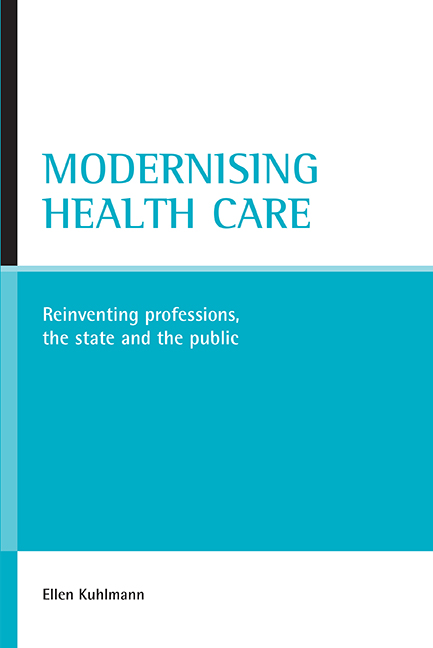Book contents
- Frontmatter
- Contents
- List of tables and figures
- Acknowledgements
- Abbreviations
- Glossary
- Introduction
- one Towards ‘citizen professionals’: contextualising professions and the state
- Part I Mapping change in comparative perspective
- Part II Dynamics of new governance in the German health system
- Part III The rise of a new professionalism in late modernity
- References
- Appendix: Research design of the empirical in-depth study
- Index
- Also available from The Policy Press
five - Hybrid regulation: the rise of networks and managerialism
Published online by Cambridge University Press: 15 January 2022
- Frontmatter
- Contents
- List of tables and figures
- Acknowledgements
- Abbreviations
- Glossary
- Introduction
- one Towards ‘citizen professionals’: contextualising professions and the state
- Part I Mapping change in comparative perspective
- Part II Dynamics of new governance in the German health system
- Part III The rise of a new professionalism in late modernity
- References
- Appendix: Research design of the empirical in-depth study
- Index
- Also available from The Policy Press
Summary
Changes in the regulation and organisation of work in the German health care system, particularly ambulatory care, are mainly governed by the medical profession. This chapter therefore focuses on office-based physicians and explores how global concepts of managerialism and provider networks play out in Germany. I will assess the developments on the levels of regulation – with respect to professional self-regulation, marketisation and managerialism – and the organisation of work. Analysis of physicians working in networks and gender analysis provide additional information on the enablers of change. Results show that there is no unique voice on regulation but that physicians are creating their own pattern of medical governance. They integrate elements from new governance in order to modernise a conservative system of corporatist regulation without replacing it. This nationspecific pattern of more hybrid regulation does not generate strong dynamics on the macro-levels of institutional regulation and organisation of care; nor does it target the integration of other health occupations. At the same time, regulation and work are shaped by changes that creep into medical work and identities, ‘laterally’ and from ‘below’. Physicians’ moves towards cooperation may impact on the structure of health care but in ways that are not fully under the control of the SHI system and not intended by health policy.
Medical network culture and its contribution to modernisation
New health policies attempt to improve the cooperation and coordination of providers in order to overcome the fragmentation of services and better target the provision of health care. Data from my survey reveal that physicians are not generally opposed to new policies, but they see themselves as the ‘palace guards’ of the health care system. The vast majority, namely 95% to 97%, of the surveyed physicians stated that trust in physicians, high standards of qualification and the robustness of planning of physicians are important conditions for high quality of care. By comparison, the item ‘improved qualification and training of health occupations’ ranks much lower (80%), and ‘improved rights of patient’ brings up the tail-light (31%) (ranking: important/less important). There is a clear tendency to incorporate those elements of new policies that do not touch on self-regulation and the interests of physicians. All forms of tighter public control and market regulation are assumed to have a less favourable or even negative impact on health care.
- Type
- Chapter
- Information
- Modernising Health CareReinventing Professions, the State and the Public, pp. 99 - 122Publisher: Bristol University PressPrint publication year: 2006



